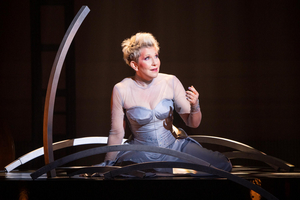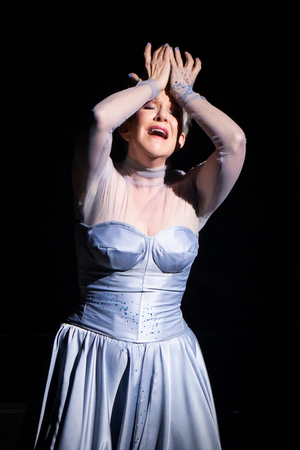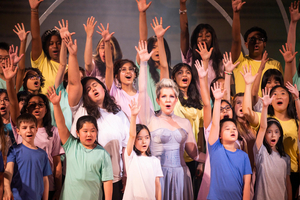Review: Joyce DiDonato's EDEN is a Little Less than Paradise at Carnegie Hall
The star mezzo, in her New York stop on a global tour, recreates her new album as a staged concert

Joyce DiDonato's recitals-as-events--where she introduces her personal philosophies as well as her art into the evening--have their ups and downs. Sometimes they are marvelous. Saturday night at Carnegie Hall, the concert, directed by Marie Lambert-Le Bihan with lighting by John Torres, that also served as part of her publicity tour for her new recording, EDEN (Erato), seemed less than the sum of its parts.
Not that I question the singer's sincerity in speaking and singing of her connection to nature, as the timing for her US venues was very close to Earth Day. Neither could I fault the variety of composers, which ran the gamut from Francesco Cavalli and Georg Frederick Handel to Aaron Copeland and Rachel Portman. And certainly not the quality of the superb accompanying musicians of Il Pomo d'Oro under Maxim Emelyanychev, who took on the music of Gustav Mahler and Charles Ives with as much enthusiasm and form as they did their usual Baroque vocabulary.

Indeed, there was much to enjoy in the program, whether DiDonato was wandering down to the stage from the side of the parterre, taking on an orchestral role in Ives' "The Unanswered Question," or introducing audiences to the commissioned "The First Morning of the World" by Portman, who's as stirred by the beauty of nature as DiDonato is (and uses winds wonderfully). Of course, her work in the Baroque is superb, as evidenced by her Handel: "As with rosy steps the morn" from THEODORA and, particularly, the gorgeous "Ombra mai fu" from SERSE (XERXES). But she was no less appealing with Mahler, in a pair of songs from the Ruckert-Lieder, most certainly with the thoughtful "Ich bin der Welt abhanden gekommen."
Yet, for me, there was a lack of variety in the program's tone that one might call unrelenting as the concert, performed without intermission, drew to its conclusion--except when she sang with the Salute to Music Choir and the (New York) All-City High School Chorus. She used them to introduce the audience to a new song, "One Seed," which was taken from songs written by youthful participants in Britain and polished by a British teacher; in a kind of Johnny Appleseed mode, she used their presence to explain the cedar tree seeds distributed to the audience.

choruses. Photo: Chris Lee
DiDonato has brought in educational programs, involving youth choruses and other partnerships, in all the global cities where her EDEN tour has stopped and, for me, it was a smart idea. Suddenly, the concert seemed to take on new life, as the group of young people came on stage to join DiDonato and the ensemble during the encores. It was almost as if she were auditioning for a production of THE KING AND I.
While their song, "One Seed," was a far cry from Rodgers & Hammerstein's "Getting to Know You," there was a joy emanating from the stage that made me think of it. Unlike another Rodgers & Hammerstein heroine, who called herself "a cockeyed optimist," DiDonato calls herself "a belligerent optimist" (from the liner notes of her EDEN recording) for her belief in the power of nature to cure the world's ills with its "awe-inducing majesty"--and for trying to play a role in seeing that it happens.
Reader Reviews

Videos

